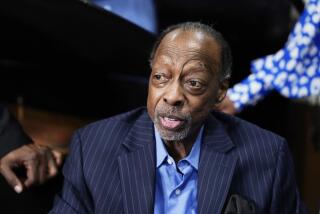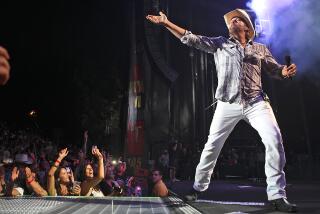Bob Burnett dies at 71; member of folk group the Highwaymen
The members of the folk group the Highwaymen were freshmen in the same fraternity at Wesleyan University in Connecticut when they came together to perform at a campus party in 1958.
By their senior year, the quintet had a No. 1 single with their haunting version of the African American spiritual “Michael, Row the Boat Ashore,” which was a hit on both sides of the Atlantic in 1961.
Although the group had a significant impact on the folk scene in the early 1960s — turning “Big Rock Candy Mountain” and “All My Trials” into folk standards — the Highwaymen disbanded in 1964 when Bob Burnett and two other members decided to attend graduate school.
Burnett, the guitar-playing tenor who became a lawyer, died Wednesday at his home in East Providence, R.I. His family said he had a brain tumor. He was 71.
“The original Highwaymen, along with the Kingston Trio and later, Peter Paul and Mary, were among those responsible for popularizing American music — call it folk, blues, country, whatever,” Kris Kristofferson told The Times when Dave Fisher, lead singer of the Highwaymen, died last year.
At first they called themselves the Clansmen, a reflection of the Scottish and Irish influences in their repertoire. As students on a campus in the Northeast in the late 1950s, they were unaware of the name’s racial connotation in the South.
Once their harmonizing caught on, their manager suggested the name the Highwaymen, in honor of the early 1900s poem by Alfred Noyes.
They followed their first hit record with “Cotton Fields,” which broke into the Top 20. Their version is credited with reviving what was then an obscure song by folk-blues musician Leadbelly. It was their last major success.
The Highwaymen regularly performed in Greenwich Village at the height of the folk music scene and recorded eight albums before parting amicably.
The other founding members were Chan Daniels, who died in 1975; Steve Butts, who earned a doctorate and became an academic administrator at the college level; and Steve Trott, who eventually became a judge for the U.S. 9th Circuit Court of Appeals.
When a group of country music superstars — Johnny Cash, Waylon Jennings, Willie Nelson and Kristofferson — started performing as the Highwaymen, the original group filed suit.
The dust-up was quickly resolved when Jennings suggested that Burnett and his bandmates open for the country quartet in 1990 in Los Angeles. The folk-music Highwaymen agreed, and the renewed exposure and recognition led them to perform around the country over the following two decades.
Robert Burnett was born Feb. 7, 1940, in Providence and grew up in Mystic, Conn.
He majored in political science at Wesleyan while establishing school pole-vault records and earning a bachelor’s degree in 1962. After graduating from Harvard Law School, Burnett worked as a trusts lawyer for several banks before retiring from Bank of America.
He temporarily left the Highwaymen in 1962 to serve in the Army. At basic training in Fort Dix, N.J., he met the colonel’s daughter, Kathleen Cullis; they married in 1964.
In addition to his wife, Burnett is survived by a son, Michael; two daughters, Melissa and Katherine; nine grandchildren; and two brothers.
More to Read
Start your day right
Sign up for Essential California for the L.A. Times biggest news, features and recommendations in your inbox six days a week.
You may occasionally receive promotional content from the Los Angeles Times.





















































